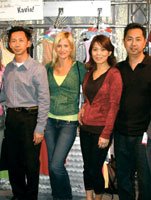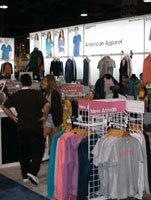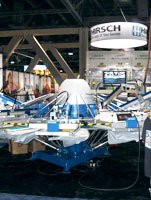ISS Show Draws on 'Recession-Proof' Products
With the credit crunch putting a cramp on big-ticket purchases, the focus turned back toward entrepreneurial and smaller businesses at the Imprinted Sportswear Show, held Jan. 22–25 at the Long Beach Convention Center in Long Beach, Calif.
Attendance was strong, according to several exhibitors. ISS’ new show director, Nikki Houston, did not disclose the final tally but said, “Our attendance numbers exceeded our expectations.” (Last year, the show drew about 13,000 buyers.)
Houston did say that there were about 375 exhibitors in attendance. Products included blank apparel for corporate and fashion applications, machinery such as embroidery and screen-printing machines, heat presses, four-color and digital printers, and accessories.
Scott McCaskill of Preston, Wash.–based corporate apparel specialist SanMar echoed the thoughts of many of the exhibitors at the show.
“It went better than expected. We ran out of catalogs,” he said.
Exhibitors said the barriers to entry in the decorated apparel market are being lowered as a result of low costs of staple items such as T-shirts and the fact that technology is improving, making printing and other imprinting applications more accessible to small businesses and entrepreneurs.
Cerritos, Calif.shy;–based Insta Graphic Systems illustrated this point at the show with its new I-press heat-transfer press, which is priced at $675. The unit is being marketed to small businesses, hobbyists and even schools. It’s small, with a 13-inch platen, and weighs less than 40 pounds.
“It’s great for small runs,” said company President Janet Wells. “We’re seeing [sporting goods dealers and schools] using it to print numbers onto uniforms. And it’s great for T-shirts, which are recession-proof.” Wells hosted a party at the show to mark the company’s 50th anniversary.
Brother International and partner Stitch City Industries were highlighting Brother’s line of digital printers such as the GT-541, a small unit that can print simple to complex graphics onto tees, shoes, denim and other garments. Brother recently donated one of the machines to Fashion Business Inc. in Los Angeles, which is conducting training sessions and rentals for the machine. It’s well-suited for samples, small-lot runs and promotional purposes, said Brother representatives.
Ink suppliers, such as Jantex Inks & Beyond of Pico Rivera, Calif., were highlighting eco-friendly inks, given the implications of the Consumer Product Safety Improvement Act, which regulates the amounts of phthalates that can be used in garment production. The company is also certifying its inks through GOTS (Global Organic Textile Standards).
Most of the interest at the ISS show was for its new series of burnout inks aimed at T-shirt screen printers. The inks come in six primary colors, which can be mixed. Jantex reformulated its burnout chemistry so that printers can incorporate the dye sublimation into the burnout area because of its poly content, explained Chief Executive Officer Jan Springer.
“People are getting creative with it. They’re creating simple prints and doing zebra-style patterns,” she added.
At the Avid Inks booth, Director of Sales Paul Carpenter said Avid’s sublimation printing services are growing in demand because of the constraints of the economy.
“[The economy] is forcing domestic sewers to keep their inventories low and to control their timelines more than ever,” he said, explaining that because Avid has a vertical operation, it can react more quickly.Blank garment suppliers mostly reported strong leads and sales throughout the three-day show.
Mark Smalley of American Apparel characterized traffic as “exceptional.” He said interest was strong for the company’s new heavyweight 7-ounce tees. “They’re great for embroidery. We’ve been known for our thinner-gauge fabrics, so this is something new from our side.”
American Apparel also showed a new line of baby-rib cardigans and a series of “Flex Fleece” hoodies.
The eco theme remained strong at the show in light of CPSIA and more focus on the environment.
“The level of awareness has skyrocketed. People want to learn more,” said Kriya Stevens of Petaluma, Calif.–based Econscious, which showed a line of tees, polos, sweatshirts and caps made from certified organic cotton. The company recently became GOTS-certified.
“We’ve incorporated the sustainable business practices throughout our supply chain. We’re now bringing products to the market made with recycled polyester, which contains recycled soda bottles.”
Dean Vuong, vice president of Kavio Collections Inc., said fashion is the key to adding business. The company added vintage-wash zip hoodies priced at $10 and feminine burnout tops and beaters priced at $4.75 to the company’s collection.
“Our customers want something new,” Vuong said.
At SanMar, McCaskill said the company was doing well with Big & Tall–size clothing and the growing category of women’s uniforms and promotional wear. Still, he acknowledged business is tough in all sectors right now.
“We’re a family-run company,” he said. “We have strong financing and are poised to ride this out.”
























